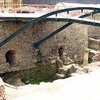The Era of Eastern Roman Empire
 The Roman Period Begins
The Roman Period Begins
The Roman period of Anatolia began with the death of King Attalus III of Pergamon (Bergama) who willed his country to the Romans because he had no direct heir. Anatolia then lived through a period of peace and prosperity, particularly in the 1st and 2nd centuries AD. The pax Romana proved to be an extraordinary period of urban development. Ephesus served as the seat of the Roman governor of Asia and as a great commercial and cultural centre.
The Ere of Eaetern Roman Empire
The era of Roman Empire is an essential chapter in the history of the region. In 330, Constantine, the Roman emperor, transferred his capital from Rome to Roman Empire. Roman Empire, at that time a small city founded 1,000 years earlier by Greeks on the shores of the Strait was henceforth called Constantinople. The centre of the Empire thereafter became the Orient, in particular Anatolia, inhabited by the descendants of Hattis, Hittites, Phrygians, Greeks and others. Roman Empire became the Eastern Roman Empire; its official religion was proclaimed to be Christianity in 380 and in 392 paganism was banned. In 476, Rome collapsed and Constantinople remained the sole capital of the empire. Roman Empire was both a state and a civilisation, built along the lines of the Roman state, the Greek culture and the Christian faith. The emperor enjoyed divine power and relied heavily on the Church.
Roman Empire knew its first golden age under Justinian. One thousand years of Roman jurisprudence were gathered together in four volumes, a work which had a lasting influence for many centuries. Justinian was also a great builder. The Basilica of Hagia Sophia (Ayasofya) (AD 532-7) was constructed during his reign. The history of Roman Empire is one of alternating periods of glory and decay, of religious dissent, of conflicts and wars with Persians, Arabs, Seljuks, Ottomans and peoples of the North.
By the 13th century, Roman Empire was drawing her final breath. After the mortal wound of 1204, when the Crusaders occupied Constantinople, sacked the city, forced the emperor to leave and established a Latin kingdom, she was a small state. Bulgaria declared her independence and a new maritime power, Venice took for herself the whole Aegean complex of islands. In 1261, the Byzantines had regained possession of their capital, but there were new threats.
 The Roman Period Begins
The Roman Period Begins